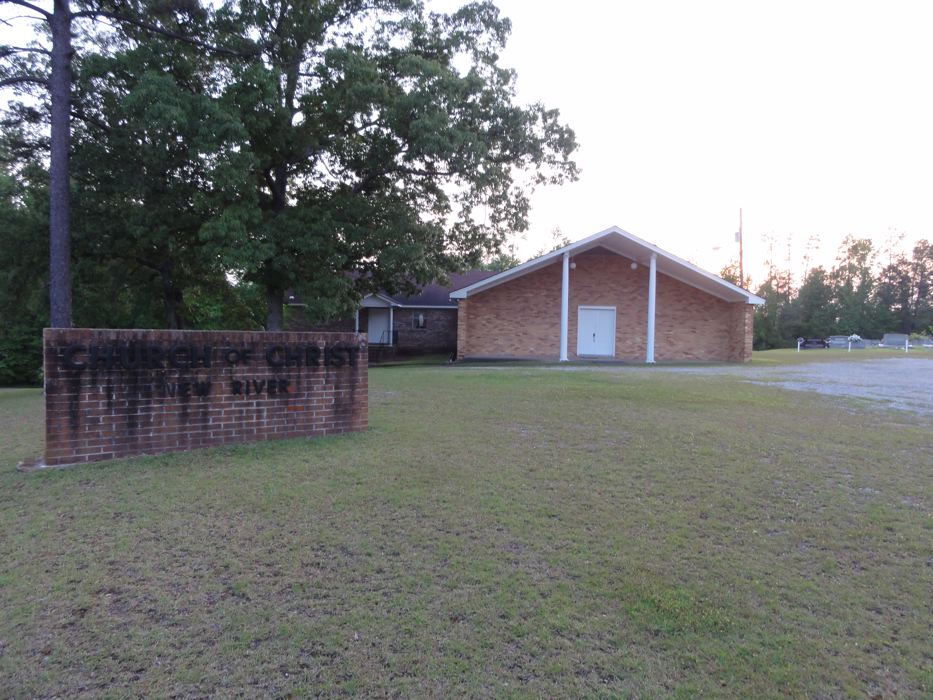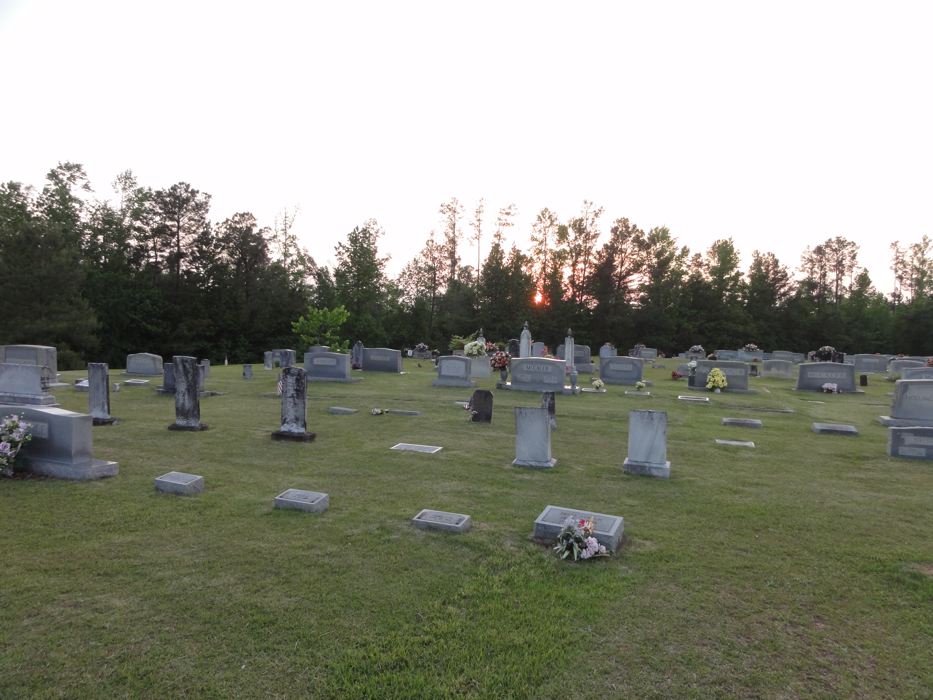Virgil Elisha Randolph
1847-1906
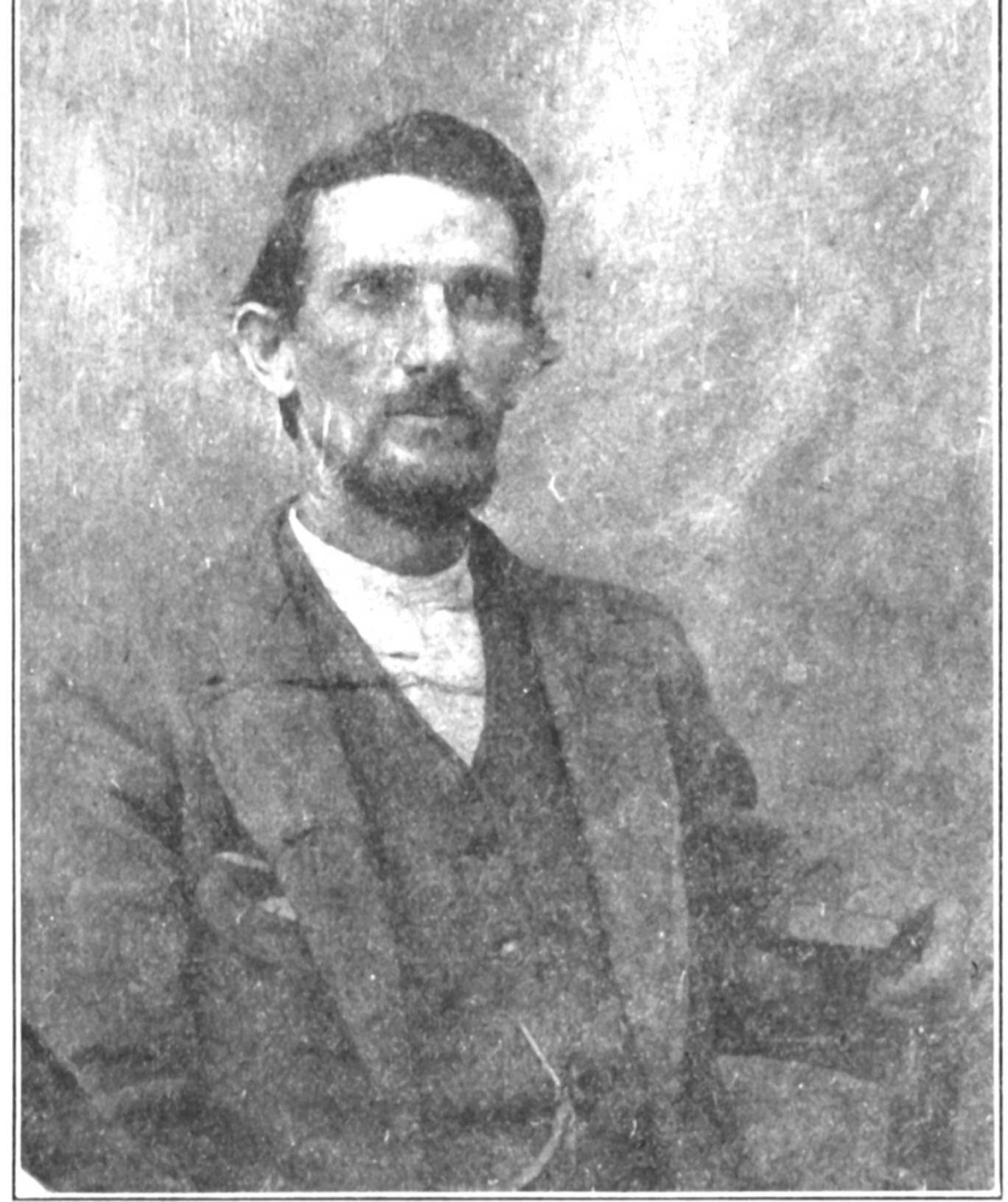
Virgil Randolph as he was featured in Gospel Advocate, 02.26.1931
Gospel Preacher Of Yesteryear In Fayette County, Alabama
In Northern Alabama the cause of Christ was planted and cultivated by such men as Tolbert Fanning, John Taylor, and Jeremiah Randolph. These pioneers labored much in preaching the gospel and refuting denominational error which had taken deep root in the minds and lives of the citizenry of that country. The progress was necessarily slow for several years. Jeremiah Randolph reared a large family, and among his sons do we find the subject of this sketch. Virgil E. Randolph was born on July 12, 1847, in Lamar County, Alabama. He was taught the way of life by his father and became a Christian in 1854 (?) at the age of seventeen. He was baptized by his father. His mother was Mary Courtney Billingsley.
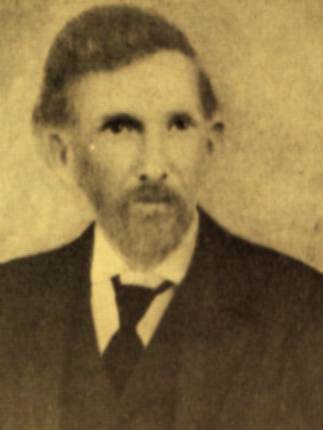 Virgil E. Randolph had no advantage of an education. He was a lover of books and read all that he could get, but there were few books in that country at that time. There were no books published by the disciples of Christ in that section of the State. The other books were very expensive and worth but little to one who had determined to follow the New Testament as his guide in his religious life. Necessarily young Randolph was forced to read the Bible, and especially the New Testament, for all his information and instruction in the way of life. Again, his father was not an educated man and did not see the advantages of encouraging his children to get an education. There were but few schools, very few books, and no vision of the power and influence that an education would give; consequently young Randolph grew up amidst poverty and with but little advantage for the training of a gospel preacher. The distressing period of the Civil War also had its influence on tbe life of young Randolph. The distressful condition of affairs in the South forced the Randolph family, already In meager circumstances, into the direst poverty.
Virgil E. Randolph had no advantage of an education. He was a lover of books and read all that he could get, but there were few books in that country at that time. There were no books published by the disciples of Christ in that section of the State. The other books were very expensive and worth but little to one who had determined to follow the New Testament as his guide in his religious life. Necessarily young Randolph was forced to read the Bible, and especially the New Testament, for all his information and instruction in the way of life. Again, his father was not an educated man and did not see the advantages of encouraging his children to get an education. There were but few schools, very few books, and no vision of the power and influence that an education would give; consequently young Randolph grew up amidst poverty and with but little advantage for the training of a gospel preacher. The distressing period of the Civil War also had its influence on tbe life of young Randolph. The distressful condition of affairs in the South forced the Randolph family, already In meager circumstances, into the direst poverty.
In 1869, Virgil E. Randolph was married to Martha (Caroline) McCaleb, the daughter of Andrew McCaleb. Nine children were born to this union, and all lived to be grown, except one, which died in infancy. (Andrew McCaleb' s wife was Leah McCollum. Young Randolph, handicapped with poverty, with no education, and with a rapidly growing and increasing family, had a hard struggle to provide the necessary things of life for his family. However, he felt the need of preaching the gospel to his neighbors. The example of his father impressed him deeply and encouraged him to make the sacrifice and preach as he had opportunity. There were very few churches at that time, but there were a number of scattered disciples in almost every district, and these were not meeting regularly for worship.
Brother Randolph saw the condition and began with his father to encourage the scattered disciples to meet on the first day of the week to break bread. Another drawback was the lack of church houses. There were no church houses accessible to the disciples, and the few brethren in the community were too poor to build church houses. The denominations were so bitterly opposed to the disciples that they would not let them use their church houses. There were very few schoolhouses in which they could meet, and oftentimes those who controlled the schoolhouses were so prejudiced that the disciples were refused the use of them. Therefore, they were forced to meet in their own houses for worship. The great work of Virgil Randolph was to organize scattered disciples into small congregation. for worship in their own houses and to instruct them in the way of the Lord more perfectly. It seems that God has always raised up a man to do the work most needed at the time. Virgil Randolph was needed, and be wrought nobly for the Lord. The disciples were not taught to contribute of their means for the support of the gospel. Brother Randolph knew that the members of the church had but little to give, and he himself did not expect them to give him anything for his work among them. He would work on his little farm and make a crop, and then in the summer and fall would go into the community and build an arbor and hold a meeting. Many times he would spend two weeks in a meeting and never receive anything for his service. He was known to give the entire summer to this kind of work and receive no more than fifty cents for his services among the people. He did not complain, for he expected nothing. He was happy in the work because he was sacrificing for the Lord. He preached in Fayette and Lamar counties in Alabama. Oftentimes he would go into adjoining counties when the door of opportunity was open to him. After be had developed into a strong preacher, he was called into Mississippi, and he made a number of trips to that state and established several congregations.
Oftentimes he had no way of conveyance to his appointments except to walk, He walked many hundreds of miles to preach the gospel. He did not wait for an invitation from a community, but when he saw the need of that community and had the time, be would go and build an arbor and begin preaching. The people learned of his meeting and began to attend. The news of his meeting would spread and his audiences always increased. People would attend his meeting by walking, riding an oxcart, and on horseback. Virgil Randolph baptized many people, but he was best suited to instruct the members of the church in the way of righteousness. Brother Randolph was a splendid singer. He had a melodious voice, and he studied the rudiments of music, so that he was a good teacher of song in the church. He sang only such songs as conveyed Scriptural sentiment and gospel truths. He preached the gospel In song. Many who were not so interested in his preaching were interested in hearing him sing. People were known to sit and weep while listening to him sing the triumphs of the Christian faith and wonderful love of Jesus for fallen man. Many times when he would go to town on business, the people would gather around him and ask him to sing "one of the songs of Zion." After singing to them a while, he would then preach or exhort them to a pious life in the service of God. He was known in North Alabama as the "sweet singer" of the disciples.
Another important item should be noticed in the life of Brother Randolph. He taught piety in his home. Possibly he was not conscious of the blessing which he himself received while training his family. It was his custom when at home to gather his children about him before retiring and sing the praises of God, read the Bible to them, and. then all kneel in prayer before God. None of the family were permitted to retire until the family worship was over. Again, in the morning, just after breakfast, another chapter was read to the family and prayer was offered for the guidance through the day, and after the prayer he would sing the song and ask his family to join him in praising God, "from whom all blessings flow." In training his family in this way he grew in grace and in the knowledge of the truth and was better prepared to go out and help his brethren and sisters live as the Lord teaches his children to live.
Brother Randolph was afflicted for many years with stomach trouble. As he grew older this affliction became more acute. He sought relief, but found none. He suffered two months with acute pain without relief. He died in the hospital at Birmingham, Ala., September 9, 1906, on Lord's day morning at nine o' clock. He was buried In New River Cemetery, where he had preached for a number of years. Services were held by Brother James Wade. lames Wade was his brother-in-law, having married Catherine McCaleb.
So ended the humble, modest, faithful life of one of God's heroes.
-Virgil E. Randolph, Gospel Advocate, Feb. 26, 1931, as reprinted in Alabama Restoration Journal, 2007, Vol. 2, No. 4, page 10.
![]()
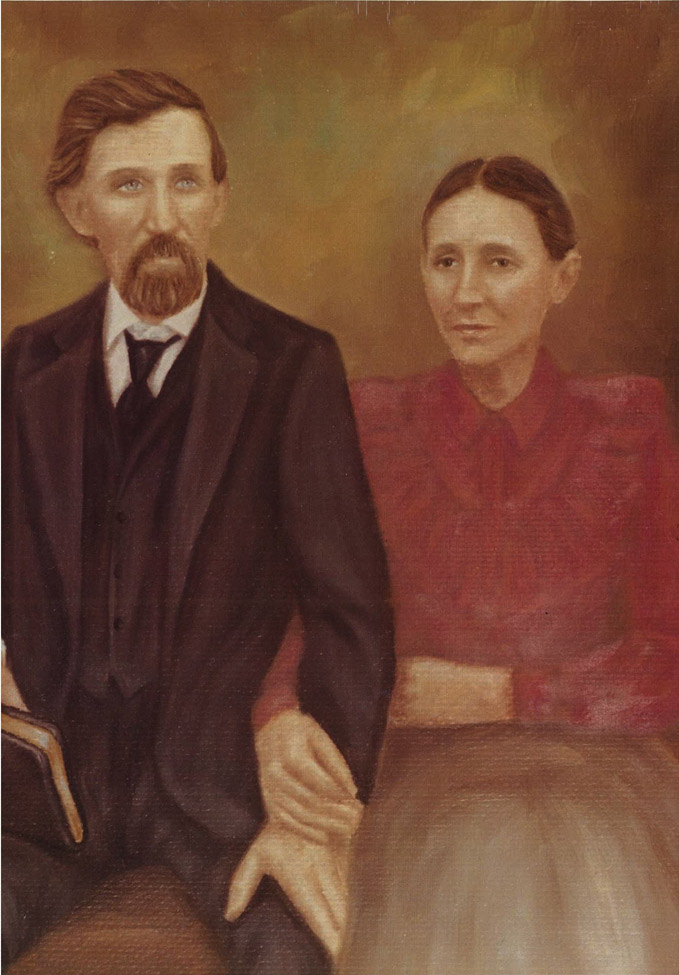
Virgil & Martha Randolph
Courtesy of George & Freda Hubbert, Descendant, 2011
![]()
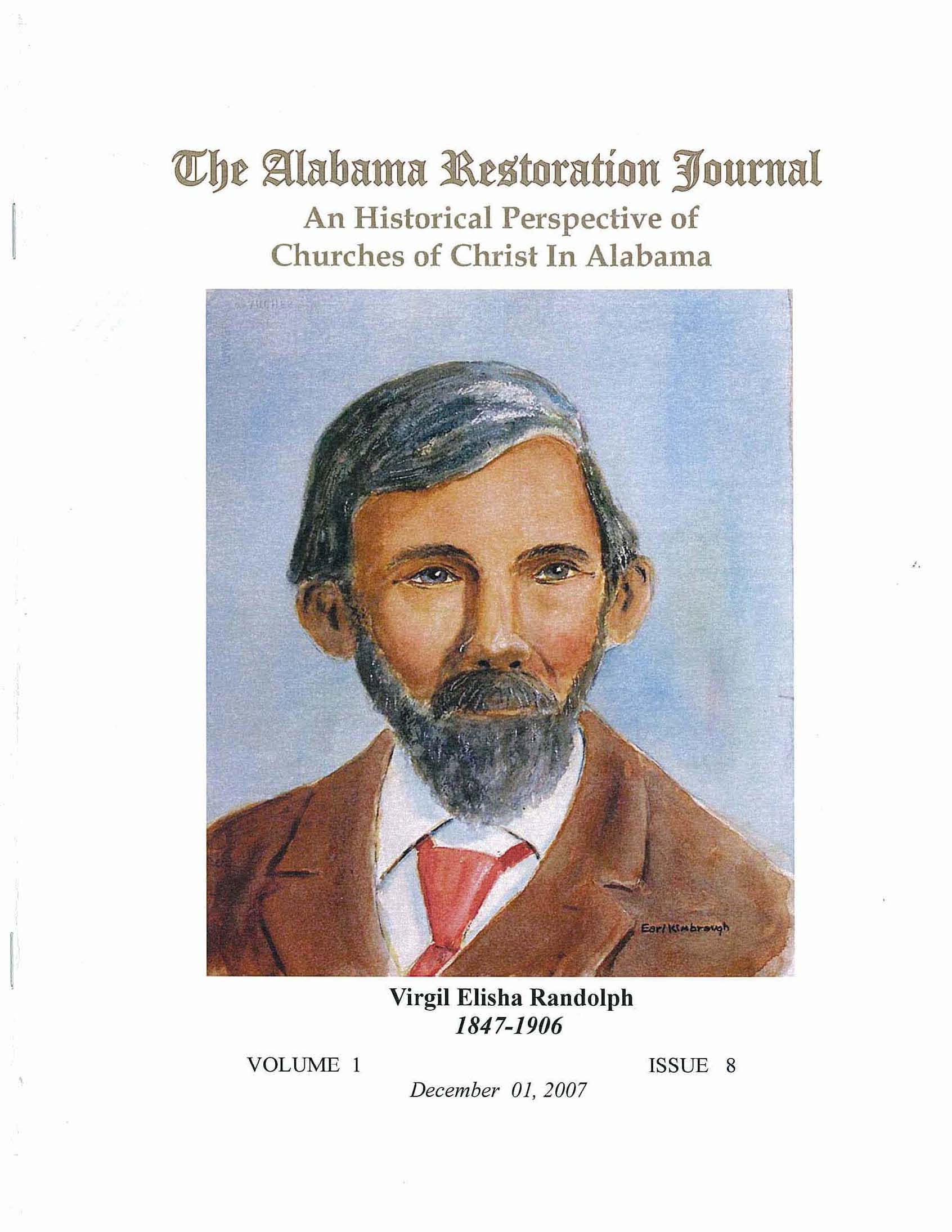
Artist's Rendition of V.E. Randalph, by
Earl Kimbrough
![]()
Location of Grave
V. E. Randolph is buried in Fayette County, Alabama in the New River Church of
Christ Cemetery. It is about 10 miles
southeast of Winfield, and about 10 miles due east of Fayette. The closest
township is the little community of Hubbertville about 3 mile northwest.
From Birmingham: travel northwest on Hwy. 78 through Jasper. The new
Corridor X is being completed that links Memphis, Tennessee and
Birmingham, Alabama. So, part
of the way can be traveled on Corridor X and part of the way is on Hwy.
78. When you get to the little community of Elderidge turn left on Hwy. 13
and head south ten miles to Hwy. 102. (It will be the next stop sign).
Turn right on Hwy 102 and head toward Fayette about 6.7 miles. You will come
to County Road 53 that goes to your left at the top of a hill. DO NOT turn there.
Go on to the bottom of the hill and County Road 53 will turn to the right. Turn
right on County Rd. 53 and go about 4 miles. You will come to County Road
49 that goes Left and Right. On the left corner is the New River
Church of Christ. The cemetery is just the other side of it.
Standing in the parking lot of the church building looking at the
cemetery, all of the graves of the preachers listed on this page will be
toward the front and on your left within 25 feet of each other.
GPS Location
33°48'26.2"N 87°43'43.8"W
or D.d. 33.807269, -87.728834
![]()
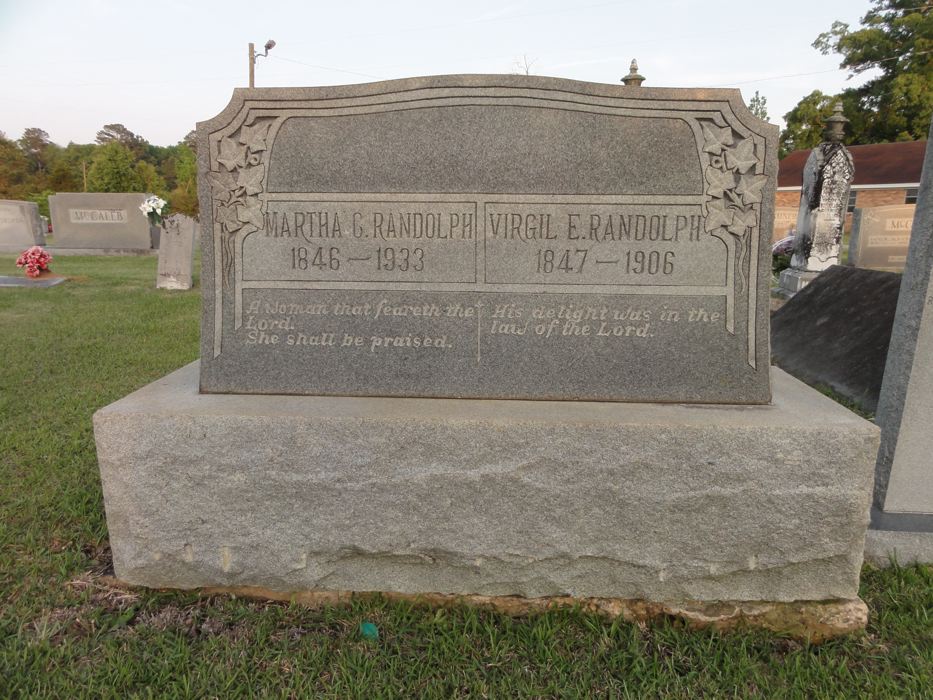
Martha G. Randolph 1846-1933
A woman that feareth the Lord. She shall be praised.
Virgil E. Randolph 1847-1906
His delight was in the law of the Lord.
![]()
Also Buried At New River Are The Following Gospel Preachers
Jeremiah Randolph
J. M. Wade
O.C. Dobbs
John T. McCaleb
![]()
